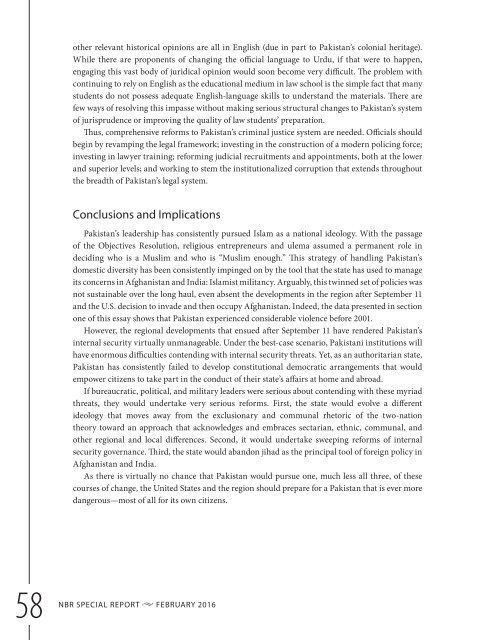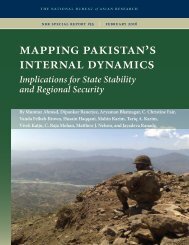pakistan’s
SR55_Mapping_Pakistan_February2016
SR55_Mapping_Pakistan_February2016
You also want an ePaper? Increase the reach of your titles
YUMPU automatically turns print PDFs into web optimized ePapers that Google loves.
other relevant historical opinions are all in English (due in part to Pakistan’s colonial heritage).<br />
While there are proponents of changing the official language to Urdu, if that were to happen,<br />
engaging this vast body of juridical opinion would soon become very difficult. The problem with<br />
continuing to rely on English as the educational medium in law school is the simple fact that many<br />
students do not possess adequate English-language skills to understand the materials. There are<br />
few ways of resolving this impasse without making serious structural changes to Pakistan’s system<br />
of jurisprudence or improving the quality of law students’ preparation.<br />
Thus, comprehensive reforms to Pakistan’s criminal justice system are needed. Officials should<br />
begin by revamping the legal framework; investing in the construction of a modern policing force;<br />
investing in lawyer training; reforming judicial recruitments and appointments, both at the lower<br />
and superior levels; and working to stem the institutionalized corruption that extends throughout<br />
the breadth of Pakistan’s legal system.<br />
Conclusions and Implications<br />
Pakistan’s leadership has consistently pursued Islam as a national ideology. With the passage<br />
of the Objectives Resolution, religious entrepreneurs and ulema assumed a permanent role in<br />
deciding who is a Muslim and who is “Muslim enough.” This strategy of handling Pakistan’s<br />
domestic diversity has been consistently impinged on by the tool that the state has used to manage<br />
its concerns in Afghanistan and India: Islamist militancy. Arguably, this twinned set of policies was<br />
not sustainable over the long haul, even absent the developments in the region ater September 11<br />
and the U.S. decision to invade and then occupy Afghanistan. Indeed, the data presented in section<br />
one of this essay shows that Pakistan experienced considerable violence before 2001.<br />
However, the regional developments that ensued ater September 11 have rendered Pakistan’s<br />
internal security virtually unmanageable. Under the best-case scenario, Pakistani institutions will<br />
have enormous difficulties contending with internal security threats. Yet, as an authoritarian state,<br />
Pakistan has consistently failed to develop constitutional democratic arrangements that would<br />
empower citizens to take part in the conduct of their state’s affairs at home and abroad.<br />
If bureaucratic, political, and military leaders were serious about contending with these myriad<br />
threats, they would undertake very serious reforms. First, the state would evolve a different<br />
ideology that moves away from the exclusionary and communal rhetoric of the two-nation<br />
theory toward an approach that acknowledges and embraces sectarian, ethnic, communal, and<br />
other regional and local differences. Second, it would undertake sweeping reforms of internal<br />
security governance. Third, the state would abandon jihad as the principal tool of foreign policy in<br />
Afghanistan and India.<br />
As there is virtually no chance that Pakistan would pursue one, much less all three, of these<br />
courses of change, the United States and the region should prepare for a Pakistan that is ever more<br />
dangerous—most of all for its own citizens.<br />
58<br />
NBR<br />
SPECIAL REPORT u FEBRUARY 2016



